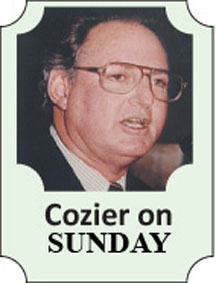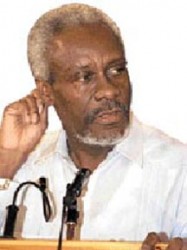A bright new future for West Indies cricket dawned last week.
At least, that’s how the West Indies Cricket Board (WICB) interpreted the comprehensive overhaul of the International Cricket Council (ICC), initiated unequivocally for their benefit by India, England and Australia, that it enthusiastically supported (“after extensive discussions and careful consideration”) at the directors’ meeting on Tuesday and Wednesday in Dubai.
There is a certain irony to its ready acceptance of such a radical transformation to the way the world game is administered.
Twice, it has commissioned independent committees to advise on just such change to its own organization. Twice, it has utterly ignored them.
The remit of the first, headed by the former Jamaica Prime Minister P. J. Patterson, was “to consider the composition and structure of the WICB and to make recommendations which will improve its overall operations, governance effectiveness, team performance and strengthen its credibility and public support.”
It presented its comprehensive report in October 2007. Last year, a frustrated Patterson charged: “I challenge anyone to point out a single iota or even the semblance of change which has been made to the composition and structure of the WICB as a result of our report.”
A similar brief was subsequently given to a team of three, under chairman of its governance committee, Queen’s Counsel Charles Wilkin. It presented its report in January, 2012.
It has gone the same way as Patterson’s.
“The territorial board directors flatly rejected the recommendations of the governance committee as to the restructuring of the board and refused to make any change at all to the current structure,” Wilkin, understandably irate, stated in his letter of resignation.

It was obviously marginalized as a result but it saw financial and other benefits from toeing the line. Beggars, after all, can’t be choosers.
It noted that, even though the all-powerful Board of Control for Cricket in India (BCCI) would take a “central leadership responsibility” of the ICC, it would remain a full member with all the attendant rights; its candidates would even be eligible for election to the presidency and the chairmanship of the Executive Committee (ExCo) and Financial and Commercial Affairs Committee (F&CA), both recently established under the restructuring, but not for at least five years when these top posts are reserved for the Big Three.
There was the assurance that the West Indies are no longer in danger of losing Test status, gained in 1928, or of slipping into a proposed second division. That, it explained, only applies to those ranked ninth and tenth in the ICC Test rankings – and, it pointed out, the West Indies are presently seventh (proudly adding that they are also the World Twenty20 champions).
What is more, under the new “mutually agreed” and “legally binding” Future Tours Programmes (FTP), it is possible for the West Indies to play more Tests, ODIs and Twenty20s against higher ranked opponents, both home and away.
The WICB asserted that, after “initial discussions”, India, England and Australia, “have all committed to increased tours to the West Indies over the next eight year cycle (2015-2023)”, is in addition to those currently on the existing FTP. They are the only three guaranteed to earn the WICB a profit on visits to the Caribbean.
Two sequels are that there are no longer obligations to host either unprofitable tours – those against anyone but Australia, England and India – or any during the hurricane season, as has obtained for the past 20 years.
The clincher, inevitably, involved money.
It came through the proposed sharing of the ICC’s revenue between its members over the eight year cycle from 2015 to 2023; the WICB has projected an increase of at least 100 per cent on what it got under the previous arrangement between 2006 and 2014.
No figure was given; it is reportedly between US$70 and US$80 million. While it pales in comparison with the $568 million that is slated to go to India in recognition of the estimated 80 per cent it contributes to the ICC’s revenue, mainly through its media and commercial rights contracts, and even England’s $173 million and Australia’s US$130.5 million, it is a tidy sum for a region comprised of small islands with struggling economies and limited populations.




The question is how will it be utilized. The WICB’s answer is that it would allow it “to realistically examine the possibility of a menu of initiatives and expansions”, principally increasing the number of regional matches in all formats.
Richard Pybus, the new director of cricket, has already recognized the constraints of the current Nagico Super50 in Trinidad, with its maximum of five matches a team, minimum of three. It needs to revert to its 2013, non-sponsored format in which each team met the other prior to the semis and final.
The same holds true for the first-class tournament, now limited to one round.
The promise of an annual Test match fund, conceived to support members other than the Big Three in hosting loss-making series, provides what the WICB described as a “financial buffer” for hosting unprofitable series against lesser teams. At present, the West Indies’ faltering, never-ending standards are part of that equation.
The WICB’s optimistic take on what has emerged from Dubai sounds too good to be true. It has enough previous experience to appreciate that it often turns out to be just that. Remember the name Allen Stanford?
We eagerly await further developments.





